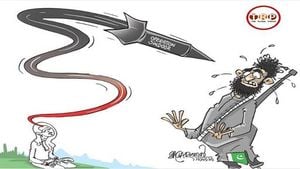On Wednesday, May 7, 2025, the Plenary of the Chamber of Deputies in Brazil approved a controversial measure to suspend the criminal action against federal deputy Alexandre Ramagem (PL-RJ), who is facing charges related to an attempted coup d'état. The decision, passed with 315 votes in favor and 143 against, allows Ramagem to avoid legal accountability while he remains in office.
The action was initiated after the Attorney General's Office (PGR) filed a complaint against Ramagem, accusing him of being part of a "crucial nucleus" of individuals aiming to undermine Brazil's democratic order. This group allegedly includes former President Jair Bolsonaro, former Justice Minister Anderson Torres, and General Walter Braga Netto, among others.
The report presented by Deputy Alfredo Gaspar (União-AL) claimed that suspending the action against Ramagem was necessary to prevent the judicial process from being used to intimidate or threaten parliamentarians. Gaspar emphasized that the suspension is not a means of granting impunity but rather a pause in the proceedings until Ramagem’s term ends, which is expected to be in approximately 18 months.
However, the implications of this decision extend beyond Ramagem. Critics argue that the wording of the resolution opens the door for the suspension to benefit other defendants, including Bolsonaro. The report does not specifically limit the suspension to Ramagem, which raises concerns among opposition parties.
During the session, Gaspar defended the proposal, stating, "Sustaining the criminal action is not throwing it to impunity, but the paralysis of the course of the process until the end of the mandate." He asserted that all constitutional requirements for suspending the action were met, including the receipt of the complaint by the Supreme Federal Court (STF) and the timing of the alleged crimes.
The decision to suspend the criminal action was met with significant backlash from opposition lawmakers. Lindbergh Farias (PT-RJ), the leader of the Workers' Party in the Chamber, condemned the move, asserting that it effectively blocks the trial for 34 defendants, including Bolsonaro and several former ministers. Farias described the resolution as a clear attempt to obstruct justice, stating, "To block an action that has not even started is clearly unconstitutional. It is an aberration to want to block the action against Bolsonaro now that the trial is about to begin."
Following the approval of the suspension, the president of the Chamber, Hugo Motta (Republicanos-PB), stated that the resolution would be forwarded to the STF along with the session's transcripts. He noted that the internal regulations of the Chamber do not allow for discussion on such requests, which further fueled discontent among opposition members.
Deputies from the governing coalition argued that the proposal is unconstitutional and aimed at obstructing the STF's judgment. They insisted that the Chamber's authority extends only to its members, not to other individuals involved in the case.
Despite the controversy, the measure passed rapidly through the legislative process. The CCJ had previously approved the proposal earlier that day, and the plenary vote occurred without substantial debate among the deputies. Many opposition members expressed frustration over the expedited process, with some describing it as a violation of democratic principles.
The PGR's accusations against Ramagem include five serious crimes: criminal organization, attempted violent abolition of the Democratic State of Law, coup d'état, qualified damage by violence and serious threat against Union assets, and deterioration of listed property. The PGR highlighted that Ramagem allegedly provided technical support for the coup plan, including preparing documents to facilitate misinformation campaigns regarding the security of electronic voting systems and the legitimacy of the electoral institutions involved in the 2022 elections.
As the debate continues, it remains uncertain how the STF will respond to the Chamber's resolution. The court has already indicated that it may not allow the complete annulment of the process against Ramagem, suggesting that only two of the five charges—those related to actions taken after his election—might be affected.
The situation reflects broader tensions in Brazilian politics, particularly surrounding the aftermath of the 2022 elections and the ongoing investigations into the January 8, 2023, coup attempt. As the legal battles unfold, the implications for democracy and accountability in Brazil are under intense scrutiny.
In summary, the recent decision by the Chamber of Deputies to suspend the criminal action against Alexandre Ramagem raises significant questions about the integrity of the legislative process and the potential consequences for other defendants involved in the coup plot. With the political landscape in Brazil remaining volatile, the coming weeks are likely to see further developments in this high-stakes legal drama.





